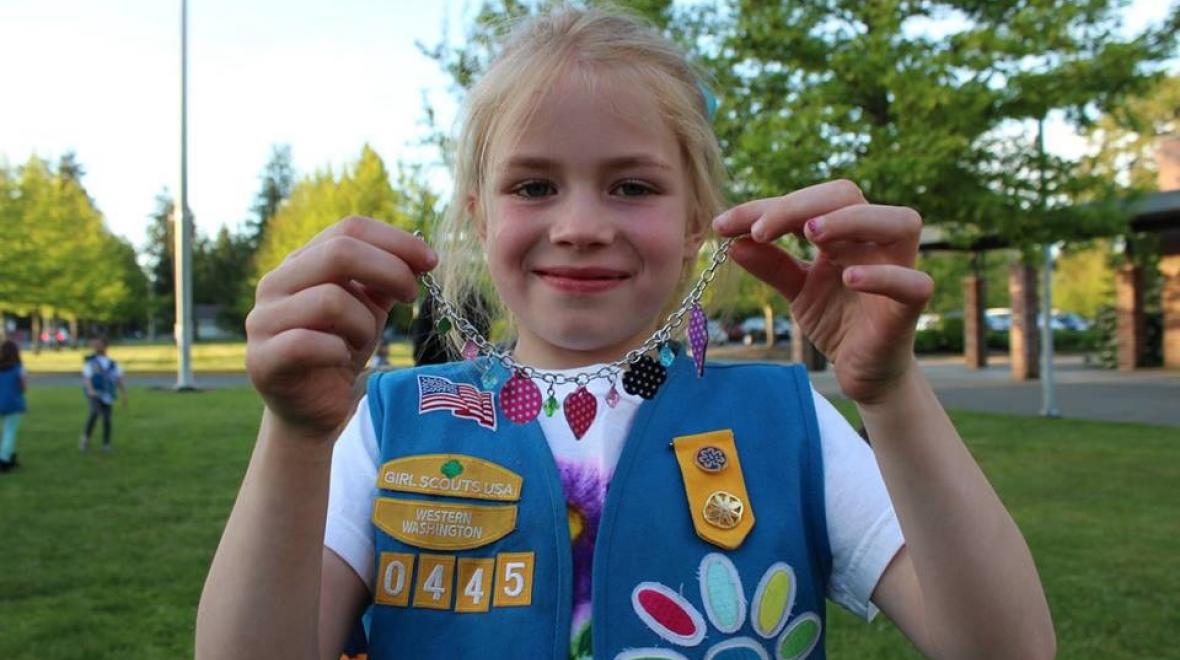
Photo:
The author's daughter. Credit Rory Graves
A few weeks ago, as I hiked up a lush-green trail near Olympic National Park with 12 second-grade girls, I was overcome with a feeling of hope for the next generation of women. I marveled at what the world might offer this group of smart, kind, brave girls — my Brownie Girl Scout troop. In the wake of the #MeToo movement, in an era where we still have more fortune 500 CEOs named “James” than female fortune 500 CEOs, the need for Girl Scouts is greater than ever.
I’m the co-leader my daughter’s Girl Scout troop and my husband leads our younger son's Boy Scout troop (still in the Cub stage). Scouting is in our family’s blood. We’ve watched our two boys and our daughter venture down parallel paths — selling popcorn and cookies to raise funds for their troops, beaming with pride when they earn a new badge. Both Boy Scouts and Girl Scouts have helped our children forge friendships, develop confidence and learn new skills that will serve them throughout their lives.
The Boy Scouts of America (founded in 1910) and Girl Scouts (founded 1912) are two separate organizations. They have developed parallel to one another, and though they share many similarities, they remain two distinct organizations.
I was raised in a predominantly Mormon community outside of Boise, Idaho. For over a century, the Boy Scouts and the Mormon church have had a partnership in which every boy is automatically enrolled in Scouts. Growing up, I watched as my male peers raced pinewood derby cars, learned to canoe and went hiking and camping — and earned their Eagle Scout rank. Our church had its own program for young women. The awards I earned centered on domestic skills — cooking, cleaning, caretaking. The Eagle Scout equivalent rank I achieved, called Young Womanhood Recognition, is essentially unknown outside the church. I sometimes wonder how I might have benefitted if I'd had the opportunity to join a Girl Scout troop, to go on adventures similar to my male peers, to participate in activities that didn’t reinforce stereotypes about what I was capable of as a woman.
Boy Scouts changing its policies
Major changes are afoot for the Boy Scouts. Last October, Boy Scouts of America announced it would soon allow girls to join the organization — with mixed-gender Cub Scout packs in the summer of 2018 and girl-inclusive teen programs rolling out in 2019. On Tuesday, Boy Scouts and the Mormon Church announced that they will be severing all ties by 2020, a move that will dramatically reduce membership numbers in Boy Scouts nationwide. This follows an unveiling last week of the new “Scout Me In” marketing campaign and a name change for the Boy Scouts program to Scouts BSA.
I’ll be honest: I question the sincerity of this decision to allow girls, as they hemorrhage membership from their largest faith-based partner — nearly 20 percent of its 2.3 million members. I question the organization's approach to inclusivity. I also have reservations about an organization’s ability to empower girls through a curriculum that has long been developed only for boys.
For years Boy Scouts has had less inclusive policies and has trailed far behind Girl Scouts in changing its policies to welcome more to participate. Prior to 2012, Boy Scouts banned openly gay youth from the program, and a ban against gay leaders wasn’t lifted until 2015. A local troop felt the sting of this policy in 2014 when Boy Scouts of America rescinded the charter of the troop at Rainier Beach United Methodist Church in Seattle because their leader was openly gay.
Girl Scouts leading the way
Since the organization's inception, Girl Scouts has been a trailblazer for equity. Founded in 1912 by Juliette Gordon Low, the very first troop of 18 girls did what many Girl Scouts still do today — going hiking, swimming and camping — bold endeavors for a time when women wore petticoats and hadn’t yet won the right to vote. Girl Scout troops supported women’s suffrage and were allies of the Civil Rights movement — Dr. Martin Luther King, Jr. called Girl Scouts a “force for desegregation.” Through the decades, Girl Scouts has paved the way for women in leadership and STEM fields (fun fact: over 20 of NASA’s career astronauts were former Girl Scouts).
Locally, Girl Scouts has been willing to sacrifice profits for principle. In 2015, when Girl Scouts of Western Washington recieved a $100,000 donation that stipulated the funds could not be used to support inclusion of transgender girls, the organization returned the funds to the donor and launched its #ForEveryGirl campaign to recoup the lost funds.
But it’s not just the history of Boy Scouts compared with Girl Scouts. For women, representation matters. A curriculum that models women in leadership, that showcases strong women in history and in fields where they are typically underrepresented, is crucial. For example, when Brownies earn their Inventor badge, they don’t just learn about inventors throughout history — they learn about women inventors. How many female inventors can you name? Girl Scouts not only gives its girls essential tools for combating the gender stereotypes and sexism that they may face throughout their lives but inspires girls to know that, with enough grit and determination, anything is possible.
Looking to the future
I’m glad that the Boy Scouts has made strides to be more inclusive of LGBTQ members. I’m hopeful that including girls in their programming will help more kids have the opportunity to participate in scouting. Finding volunteers who are willing and able to lead troops is hard. I started a new troop so that my daughter could participate because there wasn’t one with an opening in my area.
And as a household with two parents working full-time, I see the appeal of having all of my kids in the same program — putting my daughter in BSA Scouts alongside my boys might mean less running around and coordinating. But I won’t be taking my daughter out of the program that has the best track-record for inclusivity, for teaching girls leadership skills and for striving to serve a culturally and racially diverse membership.
Instead I will double-down on my support for Girl Scouts, even as the new Boy Scout policy is likely to draw some girls away from Girl Scouts. Juliette Gordon Low is famous for saying “Right is right, even if no one else does it.” Girl Scouts has been doing the right thing for years. Our country still has a long way to go in closing the gender gap, but it’s Girl Scouts, not the newly-inclusive BSA Scouts, whose primary goals remain raising future female leaders and modeling a world where gender doesn’t diminish a girl's opportunities. I’m proud to be a Girl Scout leader because creating safe, inclusive spaces for girls to grow into leaders is essential.











